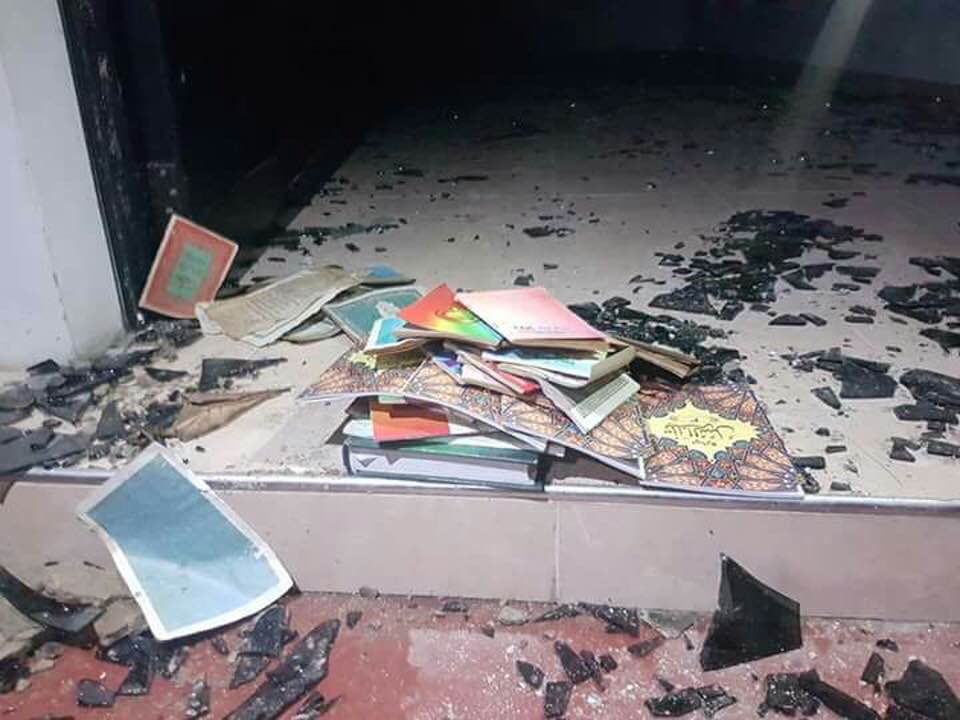Attacks Against Minority Muslims In Ampara, Eastern Sri Lanka

By Mohamed Fazil –MARCH 3, 2018
 At least five people were wounded, and several shops and a mosque were damaged in a clash between majority Sinhalese Buddhists and minority Muslims in Ampara, Eastern Sri Lanka, on Tuesday. The attack in Ampara transpired after a group of people accused a Muslim shop owner of incorporating “sterilization pills” into food. Although doctors in the field announced through social media that such an act is impossible, the Muslim shop owner should inquire for the court or a relevant authority.
At least five people were wounded, and several shops and a mosque were damaged in a clash between majority Sinhalese Buddhists and minority Muslims in Ampara, Eastern Sri Lanka, on Tuesday. The attack in Ampara transpired after a group of people accused a Muslim shop owner of incorporating “sterilization pills” into food. Although doctors in the field announced through social media that such an act is impossible, the Muslim shop owner should inquire for the court or a relevant authority.
The protracted conflict between the Sinhala and the Tamil transformed into the 26-year Sri Lankan civil war that ended in 2009 when the military defeated the LTTE. The state has yet to attempt meaningfully resolving this conflict. Unfortunately, anti-Muslim campaigns and numerous attacks against the religious rights and economy of Muslims increased after the civil war. The clash in Ampara is yet another widespread contestation between the Sinhalese majority and the Muslim minority who complained that in this incident, the police failed to control the mob attacks against them, the mosques, and other properties. Muslim politicians and civil society organizations requested that the government conduct impartial inquiry and take essential measures to arrest the culprits.
In a newly released report, Amnesty International (2017/2018) noted that last year, “Sri Lanka saw a rise in Buddhist nationalist sentiment, including attacks against Christians and Muslims.” In September 2016, a group of hardline Buddhist monks attacked the homes of Rohingya refugees in Boosa, southern Sri Lanka, and in November, dozens of Muslim homes and businesses were attacked near the southern city of Galle. According to media, these incidents are the main reason why the abovementioned report included such statements. In this light, the 37th session of the United Nations Human Rights Council (UNHRC) commenced on 26 February 2018. Media reported that Ampara incident has been informed to the UNHRC officials via some civil society organizations within this week. The ongoing session will reportedly allow international human rights organizations to submit the arguments they incurred from several parts of the world. The clash in Ampara along with the aforesaid report might also induce increased criticism on Sri Lanka at the UNHRC session, which may vehemently mar the image of the country.
It is important to mention here that attacks and discrimination against to the religious minority should stop to avoid another full-range of ethnic contestation, therefore following measures can be considered to avoid future clash:
If any clash or ethnic contestation were to occur anywhere in the island, then a high level of police authority in that region must be accountable for maintaining law and order. However, these attacks against minorities would only be inhibited if the police acted without partiality. The post-independence history of Sri Lanka imparts a powerful message to the Sri Lankan and international communities: partiality that originates from state police and security forces is one of the root causes of widespread violence against minorities.
Specially trained peace-keeping forces can be deployed in each district to control attacks against particular religious groups and to maintain a peaceful environment.
Furthermore, the government should ensure that its officials, including members of law enforcement bodies, respect religious freedom and abstain from discrimination based on religion or belief. Officials should also be trained on basic human rights, especially religious freedom.
Fragmented Muslim politicians and civil society must take collective dealings and request to the government to give safeguard and compensation for the attacks against to their community and property. Powerful ministers from the Muslim community must stop to gain political advantage during their people face challenges.

